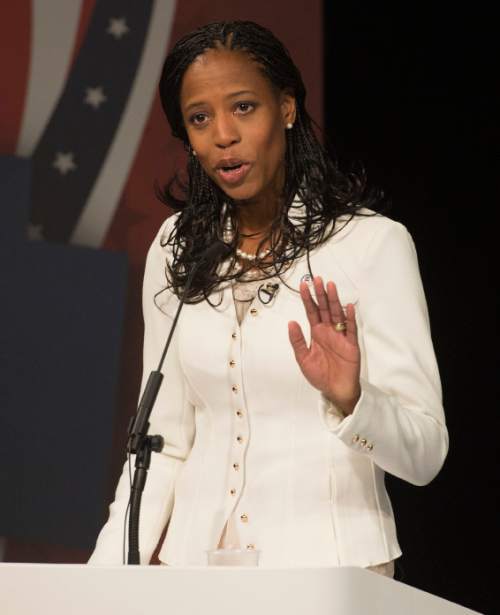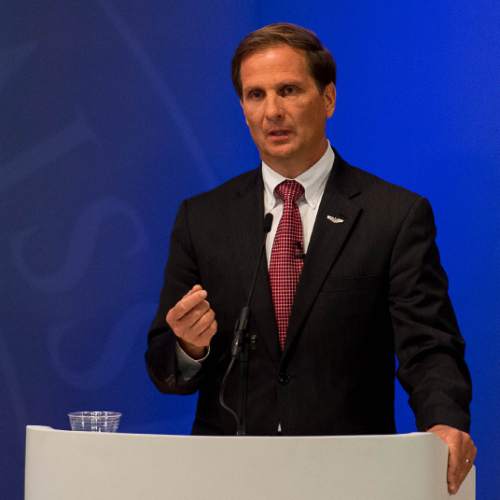This is an archived article that was published on sltrib.com in 2016, and information in the article may be outdated. It is provided only for personal research purposes and may not be reprinted.
As U.S. Rep. Chris Stewart, R-Utah, traveled around rural New Hampshire shaking hands and talking politics, he found it oddly similar to his trips to the redrock country he represents in Congress.
"It was like campaigning in southern Utah," said Stewart. "The people we met, I thought, this is just like being in southern Utah."
But he wasn't in St. George any longer.
Stewart, a former Air Force pilot who now sits on the House Intelligence Committee, has become a surrogate for Republican presidential candidate Marco Rubio. And that means representing the Florida senator's views and talking up his virtues.
"He'd make our [party's] best candidate," Stewart said. "I think he'd make our best president. I want him to win."
All four of Utah's House members have endorsed Rubio, while U.S. Sen. Orrin Hatch, R-Utah, is supporting Jeb Bush and, so far, Sen. Mike Lee has remained neutral in the Republican primary.
There remains plenty of debate about whether endorsements matter much in politics, but often that conversation focuses specifically on whether the power of one personality could sway voters. It tends to ignore that high-profile backers can attract campaign contributions, act as surrogates at campaign events, and push the candidate's message in interviews on cable TV.
"Candidates can never shake enough hands on their own. They need people to advocate for them. They need people to vouch for them," said Jason Perry, director of the University of Utah's Hinckley Institute of Politics.
So an endorsement not only lends credibility to a candidate, but also provides the candidate with a helping hand.
U.S. Rep. Jason Chaffetz, R-Utah, traveled the country on behalf of Mitt Romney in 2012, even parking himself at the Democratic National Convention in Charlotte, North Carolina, to be a conservative counterpoint.
He initially said he had no desire to endorse in 2016 and that he'd focus exclusively on his work as chairman of the House Oversight and Government Reform Committee.
But as the race heated up, he couldn't help himself.
"I just felt so strongly," he said, "that Marco is our best foot forward."
Chaffetz endorsed Rubio on Jan. 6, becoming the last of Utah's House delegation to do so. Two days later, he flew to New Hampshire to campaign for the Florida senator. The day after that, Chaffetz was in South Carolina, which holds its first-in-the-South primary on Saturday.
Since then, Chaffetz returned to New Hampshire twice, including for a rally at Hood Middle School in Derry, just four days before the primary. Chaffetz joined Sen. Tim Scott and Rep. Trey Gowdy, both from South Carolina, to introduce Rubio before a large and enthusiastic crowd. Chaffetz received a huge cheer even before he finished saying the word "Benghazi" in introducing Gowdy, who is leading an investigation into the 2012 terrorist attack in Libya.
Earlier that day, the Rubio campaign asked Chaffetz to go to a diner and shake some hands, but when he arrived, he saw a group of cameras and people in suits. They told him former Florida Gov. Jeb Bush was about to make a campaign stop.
"So I skedaddled," he said. "I'm not here to trash their party. I left. It really is elbow to elbow up here in New Hampshire."
At least it was.
Last Tuesday, the Granite State held its primary and Rubio finished fifth after a poor debate performance. Billionaire celebrity Donald Trump won the contest handily.
Chaffetz has made two visits to Nevada on Rubio's behalf and may do another trip before the state holds a Feb. 23 caucus. Stewart has also visited Nevada. As has Hatch, who was there last weekend, speaking to groups of caucus-goers on behalf of Bush, his favorite candidate. Last August, Utah's senior senator endorsed Bush during a trip to Nevada and appeared at a rally with the candidate in Reno.
Hatch expects to make at least one more trip to Utah's neighbor, which has a strong Mormon population, and he will continue to participate in D.C. fundraisers for Bush.
"I have enjoyed telling audiences about how Jeb put conservative principles into practice as governor of Florida," Hatch said, "and how I believe he has the experience and judgment to do the same as president."
Voters in these early states are used to seeing all sorts of politicians and celebrities standing in for the candidates, particularly when the field is crowded.
This year in New Hampshire, former Democratic presidential candidate Michael Dukakis acted as a surrogate for Hillary Clinton, as did Lena Dunham, the creator of HBO's "Girls."
On Monday, former President George W. Bush is expected to make his first campaign stop on behalf of brother Jeb in South Carolina.
"It's a long slog with these campaigns," Andy Smith, a political science professor at the University of New Hampshire, told The Boston Globe. "It's tough to keep your people motivated and focused and going. Having people in from somewhere else, be they minor or major celebrities, is one way to do that."
U.S. Rep. Mia Love, R-Utah, has been vocal about her support for Rubio, having endorsed him on live television, but she hasn't had the same travel schedule as Chaffetz.
She joined two other House Republican women Jan. 28 for a fundraiser supporting Rubio in Phoenix, and she has agreed to attend another event in Washington, D.C., that has yet to be scheduled.
Rep. Rob Bishop hasn't been traveling to help out the Rubio camp, but he has served as an unofficial adviser on public-land issues and Western priorities.
Lee is the only Utahn in Congress who hasn't endorsed a candidate. He says he's staying neutral because he has two close friends still in the race — Rubio and Texas Sen. Ted Cruz, who won the Iowa caucus and finished third in New Hampshire.





